Letter from William Benét to Lawton Mackall
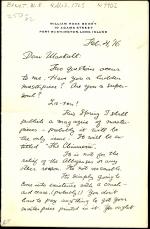
Writer and poet William Rose Benét writes to Lawton Mackall, asking him to contribute to a one-off literary magazine called The Chimaera.


Writer and poet William Rose Benét writes to Lawton Mackall, asking him to contribute to a one-off literary magazine called The Chimaera.
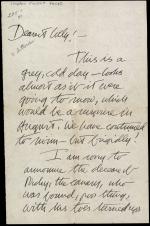
Stephen Vincent Benét writes to his sister, Laura Benét, on the slowness of his writing and distress over news from abroad. Includes envelope.

James M. McKim, a member of the Class of 1828 and an editor at the Philadelphia based The Anti-Slavery Standard, writes to a subscriber, Mr. Worrell.

George R. Mead writes to Esther Windust, offering his sympathy for the recent death of an unspecified man named Piet.

Attorney Horace Binney writes to his colleague William Rawle, enclosing an agreement in the case of Butler v. Cadwalader.
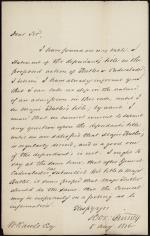
Attorney Horace Binney writes to his colleague William Rawle, asking for the defendant's title in the case of Butler v. Cadwalader.
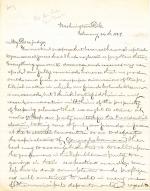
John W. Forney assures Pennsylvania Supreme Court Justice John Meredith Read that he both values and respects his opinions. Mr.
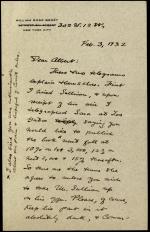
William Rose Benet writes to an unspecified "Albert" concerning the publication details of a book of poems by an unspecified "Sara." Benet also discusses details of payment.

Thomas McFadden, a member of the Class of 1845, writes Robert Black about life at Dickinson College.
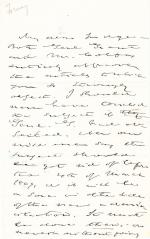
John Wien Forney writes to Judge John M. Read to address his concerns about certain newspaper articles. Forney notes that "both Genl [Ulysses] Grant and Mr.
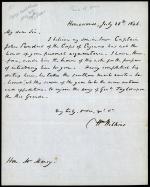
William Wilkins, Secretary of War from 1844-45, writes to his successor William Marcy. Wilkins introduces his son in law, Captain John Sanders of the Corps of Engineers.

Associate Justice of the Supreme Court John McLean, who is also a Trustee at Dickinson College, writes to N. Sargent regarding the death of former President John Quincy Adams on February 23, 1848 in Washington, DC.
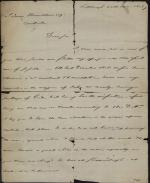
Joseph St. Leger d'Happart writes to James Hamilton, , a lawyer and member of the Dickinson College Board of Trustees, about various business affairs.
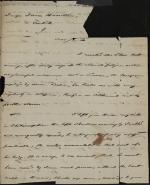
Joseph St. Leger d'Happart writes to James Hamilton about travelling from Carlisle to Pittsburgh as well as business during the trip.

Joseph St.
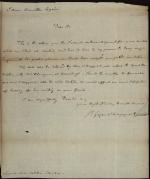
Joseph St. Leger d'Happart writes to James Hamilton, a lawyer and member of the Dickinson College Board of Trustees, thanking him for the pleasant stay while in Carlisle, Pennsylvania.
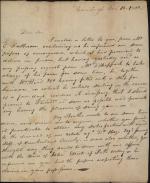
William A. Thompson writes to James Hamilton and informs him that he must proceed to Philadelphia "to take charge of [St. Leger D'Happart's] farm" and will be unable to visit as a result.

Jacob Thompson, Secretary of the Interior in President James Buchanan's administration, writes Jeremiah Sullivan Black and asks for advice on what to do about the slander in John Bonner's Child's History of the United States.

George Thompson writes Robert Magaw about obtaining soldiers' pay owed from service during the Revolutionary War and discusses the conditions for selling "the plantation in my absence." Thompson explains how "we must charge the United States with

J. M. Thompson writes to James Hamilton, a lawyer and member of the Dickinson College Board of Trustees, about the failure of the governor to commission Mr. Steel as a coroner.
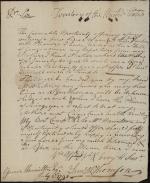
Samuel Magaw Thompson writes to James Hamilton and explains that he has been in Georgia since leaving his mother's. Thompson notes that he would be glad to hear from the family and sends compliments to his sister, Mrs. Hamilton.

Catherine Ross Thompson writes James Hamilton to thanks him for buying her a horse and encloses money to reimburse him.

John Thompson writes to attorney and Dickinson College trustee James Hamilton regarding a judgment for forty-eight pounds that Mr. Watts obtained against Thompson. "There is no such sum due them by me," as Thompson argues.
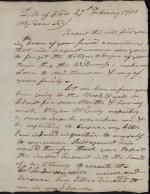
John Armstrong writes to George Thompson stating that he is "going to the woods and will be absent for some months". Armstrong also explains his intention to bring a suit against Meyer McCully on account of a small debt. Transcript inc
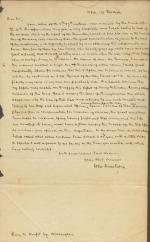
John Armstrong, Jr. writes to an attorney, Henry Mason Morfit, regarding the difficulty of obtaining evidence of military service for veterans who served during the Revolutionary War.